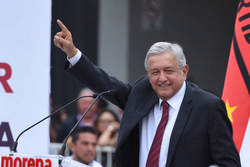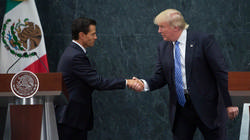As Mexico prepares to elect its next president, the lea ding candidate in the race could predict how the landscape of U.S.-Mexican relations are formed in the future.
Andres Manuel López Obrador, a former mayor of Mexico City and a member of Mexico’s left-wing National Regeneration Movement Party, leads the race by double-digits. Among other issues, López Obrador’s campaign revolves around ending social and economic inequality, combating corruption in government, and embracing a stronger tone of Mexican nationalism.
However, many detractors of López Obrador have perceived his sentiments of Mexican nationalism as being “anti-American,” something that Kenneth Mitchell, Ph.D., Chair of the Department of Political Science and an associate professor of political science says this would be “uncharted territory,” considering that all Mexican presidents dating back to Franklin Delano Roosevelt have been “staunchly pro-USA.”
In an interview with Reuters in Mexico City on Feb. 8, Hector Vasconcelos, a diplomat chosen by presidential front-runner López Obrador, spoke out about contentions made of López Obrador’s policies taking Mexico down a route similar to that in the crisis-hit Venezuela. However, Vasconcelos did say that he did not support U.S. sanctions on Venezuela’s socialist government.
“Our emphasis will be on defending the legitimate interests of Mexico, and not on trying to intervene here and there before we put our own house in order,” he said.
Additionally, Vasconcelos emphasized that Mexico would keep close ties to the United States if López Obrador were to win in July, saying that his government would seek an alliance for economic growth instead of a focus on police and military relations.
Similarly, Vasconcelos echoed Lopez Obrador’s position that Mexico should suspend talks to renegotiate the North American Free Trade Agreement (NAFTA) until a new government is elected in July, and said that Mexico had other trade options.
“We have alternatives, if for any reason we don’t manage a good renegotiation of the free trade deal, it wouldn’t be the end of the world,” Vasconcelos told Reuters.
“There are other possibilities for trade and investment in other parts of the world, such as Europe and Asia”, said Vasconcelos, who formerly served as Mexico’s ambassador in Denmark, Norway, and Iceland.
However, the United States takes about 80 percent of Mexico’s exports, despite numerous international trade deals. Moreover, the current government has stepped up efforts to diversify to other markets in response to U.S. President Donald Trump’s threats to scrap NAFTA, which includes the United States and Mexico, as well as Canada.
Nevertheless, Vasconcelos said that a López Obrador government would seek a meeting with Trump “as soon as possible.”
“I have seen him compared to Hugo Chavez of Venezuela by his critics in Mexico, due to his socialist-oriented policies, but I am not aware that Lopez Obrador defines his politics as anti-Americanism,” said Manuel Chavez, Ph.D., a lecturer of Latin American philosophy and history in the Department of World Languages and Cultures.
However, Chavez explained that there is long history of nationalist politics in Mexico that dates back to the Mexican Revolution in 1910.
“After the Revolution, the Mexican government nationalized several key industries, including oil and steel,” he said.
“Instead of anti-Americanism, I would say that López Obrador is anti-neoliberal, and thus resistant to corporation dominant markets,” Chavez concluded.
Similarly, George Gonzalez, Ph.D., an assistant professor in the Department of History and Anthropology, expounded on the presence of “anti-Americanism” in Mexico.
 “Understanding the roots of anti-Americanism in contemporary Mexico requires a prolonged encounter with longer histories and trajectories, including the annexing of Mexican territory and the Mexican-American War [which spanned from 1846-1848],” Gonzalez said.
“Understanding the roots of anti-Americanism in contemporary Mexico requires a prolonged encounter with longer histories and trajectories, including the annexing of Mexican territory and the Mexican-American War [which spanned from 1846-1848],” Gonzalez said.
“We must account for the position of economic and political dependence which the U.S. has strategically imposed on the region. The deep histories cannot be ignored as important context,” he explained.
“In many ways, the era of globalization has intensified the disparities between the global north and global south—in this case, the U.S. and Mexico,” Gonzalez said.
Additionally, Gonzalez further explained that, as a direct result of the implementation of the NAFTA in 1994, Mexican farmers could no longer compete with American producers of cheap corn because American farmers remained subsidized, but Mexican farmers were not.
“[Mexican farmers were] no longer able to earn a living in agriculture, more and more people traveled north in search of a livelihood. This basically means that people have come to survive and looking to feed the mouths of loved ones,” he said. “American workers, themselves, weakened by many of the same corporate forces, have been organized by the interests of capital to look upon immigration from Mexico as competition,” Gonzalez explained.
Accordingly, Gonzalez also identified the anti-Mexican sentiments presence in America: “A retrograde white nationalism has attached to this dynamic in too many cases,” he said.
“Mexicans are transformed into racial and cultural pollutants of the social body. The Mexican people see this. They see this by way of the very same television and Internet industries which the U.S. sold [to] the world,” Gonzalez explained.
Additionally, “Mexicans see how their food, music, and cultural resources are voraciously consumed by Americans while, in the very same instant, the Mexican persons who are the creators and purveyors of this culture are dehumanized and worse,” he said.
“The Mexican people know that Americans have short memories when it comes to something like NAFTA and its structural effects,” said Gonzalez, “In the age of Trump, an anti-American backlash [in Mexico], anti-American meaning, here, critical of American anti-Mexican racism, is sociologically unsurprising.”
In addition to the Mexican people’s disappointment in their portrayal in America, Julia Riordan-Goncalves, Ph.D., Director of Spanish and International Business Major and Spanish for Business Minor and assistant professor in the Department of World Languages and Cultures, explained that López Obrador’s rise in popularity as a presidential candidate also has a lot to do with the voters’ disappointment in their own current president, Enrique Peña Nieto, and his “failed promises and policies.”
“Crime, violence, and corruption have worsened since Peña Nieto’s second election,” Riordan-Goncalves said, “and many in Mexico are looking for an alternative to the PRI and PAN political parties that have held power for many years.”
Moreover, because NAFTA could be put on hold, or because Mexico could pull out of the agreement entirely, Riordan-Goncalves said that the candidate who wins the election this summer could “most definitely have an impact in U.S.-Mexico trade and economic relations.”
“López Obrador’s populist message appeals to many Mexicans who are fed up with corruption in politics and business,” she said. “All the front runners in this presidential election promise to fight corruption and bring economic growth to Mexico, however López Obrador’s orientation is very different from [that of President Trump].”
For instance, “López Obrador promises to put Mexico first, funding many social programs and dismantling the established political and business elite,” she said. Moreover, “the change in the rhetoric coming from the White House since January 2017 has certainly angered many Mexicans, and this, coupled with their frustration with their own political and economic difficulties, has helped to shift political opinion,” said Riordan-Goncalves.
“It seems clear that Mexico seems poised to begin a new chapter in which it is much less dependent on the United States, looking instead to its own economic capabilities and trying to improve infrastructure and social well-being,” she said.
“If Ricardo Anaya or José Antonio Meade win the election in July, most likely U.S.-Mexico economic relations will remain stable, while policies gradually shift to look for new trade alliances and foreign investment,” she explained.
“However,” she notes, “if López Obrador wins, it is possible that trade with Mexico will become more complicated, and expensive. We should all watch this election closely, because it could have an impact on the stock market and employment,” Riordan-Goncalves said.
Currently, polling puts López Obrador ahead in the race with about 42.2 percent support, and he has consistently been a solid ten points ahead of his rivals for months into the campaign.
“There are ways that López Obrador has been running essentially the same campaign for twelve years,” Patrick Iber, Ph.D., a professor of Latin American history at the University of Wisconsin-Madison, told Forbes on Monday, March 26.
“He got about 35 [percent] of the vote in 2006, and 32 percent in 2012, so he has the support of about a third of the electorate,” Iber said. “His challenge is to move a bit beyond his base, but his election will come, if it comes, more as a result of the divided nature of the opposition than because of a massive surge in his own popularity.”
IMAGE TAKEN from Washington Post
IMAGE TAKEN from Forbes



